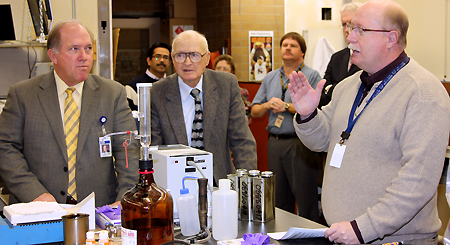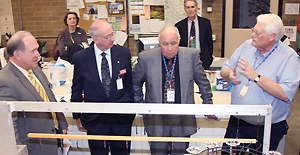
| CONNECTIONS |
IDAHO
ITD
HOME
511 TRAVEL SERVICES
IDAHO
DMV
ITD
NEWS
HIGHWAY
SAFETY
IDAHO STATE POLICE
STATE OF IDAHO
NIATT
NATIONAL
AASHTO
AAMVA
AAA of IDAHO
FEDERAL HIGHWAYS
FEDERAL AVIATION
IDAHO STATE POLICE
NHTSA
NTSB
TRB
U.S. DOT
TRANSPORTER
Archives
Milestones
Comments
Idaho
Transportation
Department
Office of Communications
P.O. Box 7129
Boise, ID 83707
208.334.8005
Fax: 208.334.8563


Highway districts official says Idahoans
consider transportation a single system
Stuart Davis, Executive Director of the Idaho Association of Highway Districts, told members of the Idaho Transportation Board last week the public does not know or care if they are traveling on a state or local route. It is important for the state and local transportation systems to work together to provide a seamless system, he said during the December board meeting in Boise.
Both the state and local systems share a responsibility of operating a transportation network that is safe and efficient.
He also reported on the findings of the local highway needs analysis. There are 18,435 miles of local paved highways, with a little more than 33 percent considered to be in poor or fair condition. The 20-year shortfall for paved roads, bringing 78 percent to into good or better condition, is almost $1.8 billion. That does not include expansion of the existing system, Davis said.
 Gravel roads comprise more than 13,000 miles, or 39 percent of the system. The shortfall for these routes is almost $2 billion.
Gravel roads comprise more than 13,000 miles, or 39 percent of the system. The shortfall for these routes is almost $2 billion.
The local highway system has 2,329 bridges of which 162 are classified as functionally obsolete and 244 are considered structurally deficient. The study recommends increasing bridge funding to $14 million annually, which would be a 75 percent increase. The 20-year shortfall for bridges is $258 million.
Including equipment and administration, the local system’s budget needs for 20 years, considering 4 percent annual inflation, is between $5.1 and $5.5 billion.
Other board discussion
Local Rural Highway Investment Program
The Local Rural Highway Investment Program was established in 2003 to assist small cities, counties and highway districts to improve their investment in their public highway and street infrastructure. The program is funded with a pool of up to $2.8 million of ITD State Highway Account funds. The Local Highway Technical Assistance Council administers the program.
By policy, the program funds may be used for 1) single highway projects, 2) a portion of a highway project’s expenses, 3) match for a Federal-aid highway project or 4) transportation planning.
The following criteria must be met for a project to be eligible for those funds:
-
The project must be on a rural public highway (outside urban area with 5000 population or greater).
-
Any funds received by any one jurisdiction in an amount greater than $25,000 shall be used for contracting out to private enterprise for the work or project to be accomplished.
-
There is a maximum limit of $100,000 on the amount of funds available to any one jurisdiction in any given year.
-
Recipients of these funds will be required to notify LHTAC if the funds are utilized for project expenditures different than that shown on the approved application.
LHTAC staff reported on the 2008 program, which continues to be very popular. There were 98 project applications, but only 32 (and two emergency projects) were funded.
Tribal information
The board reviewed agreements among the state and Native American Tribes, including the Motor Fuels Tax Agreements that the Governor’s Office established with the four Tribes.
Following are some of the additional agreements ITD has in place.
The Coeur d’Alene Tribe is being compensated to monitor construction on the Idaho 97 Harrison Bridge project. The tribal’s responsibilities include on-site construction monitoring during ground disturbing activities and watching for potential impacts to cultural resources, including traditional cultural properties, sacred areas, rock cairns and rock shelters. Similar construction monitoring agreements also were established for some U.S. 95 projects in District 1.
A memorandum of understanding was developed with the Nez Perce Tribe that requires consultation on construction, repair or maintenance projects that occur on the reservation.
- - - - -
Photos: The Idaho Transportation Board took an opportunity while meeting at Headquarters last week to tour the ITD Materials Lab.
Published 12-19-8